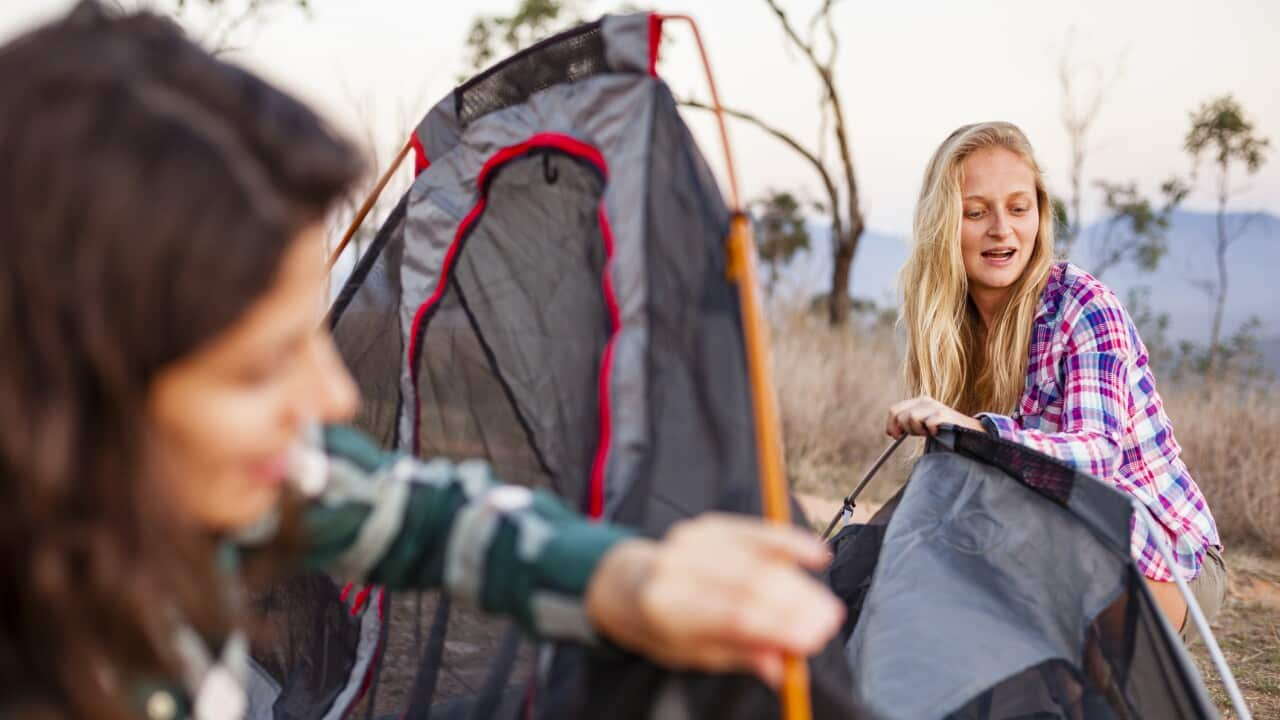英語を理解し話すことは、オーストラリアでの生活を向上させるのにとても役立ちます。ポッドキャスト、では、日々のさまざまなシチュエーションで使えるとっさの英語や表現を、あらゆる例を取り入れて簡単に説明します。
このエピソードは、中級に適しています。聴き終わったらクイズで学習成果を確認しましょう。
学習ノート
テントを張るときに使う様々なフレーズ:
- Let’s pitch this tent.
- Grab the pegs.
- Put up the tarp.
- Set up the tent poles.
- Stake down the corners.
- Make sure it’s level.
口語的な言い回し:
Every now and then ー 「時々」とか「場合によっては」などを意味するカジュアルな表現。
All the things Allan and Claire get up to ー 「アランとクレアが行うすべてのこと」を、カジュアルに、そして少しユーモラスな言い方で表現。
get up to something ー 「何か」をすること。 この「何か」は多くの場合、他の人が認めないような、いたずらっぽいことを指します。
ボキャブラリ:
Stunning ー 非常に美しい。
To stun (someone) ー 誰かの頭を殴り、ぼうっとめまいがして通常のように考えられなくすること。
Camping ー テントの中で暮らしたり、宿泊すること。
People who enjoy the outdoors can take camping holidays.
A campground or campsite ー 人々がキャンプをするために行く場所。
To pitch a tent ー テントを設営すること。
To pitch something ー 何かを投げること (to pitch a ball)。
To pitch an idea ー 誰かを、それが良案であると説得するために、アイデアを提案すること。
Gear - 趣味やスポーツで使用する「もの」のカジュアルな呼び方。
Pegs, or stakes ー ペグ、杭
To grab something ー 正式には何かを素早く手前に引き寄せるという意味。オーストラリア英語では、単に何かを手に入れたり、何かを手渡したりするという意味でカジュアルな場面で使用される。
例えば、‘let’s grab a bite to eat! (ちょっと食べに行こう!) などがよく使われる。
To stake down the corners ー 安全に固定するため、テントの角にペグや杭を刺すこと。
To tilt ー 斜めに傾けること。平坦にしないこと。
A tarp ー タープ。通常はプラスチックでできた大きな防水シートで、濡らしたくないものを覆うのに使用できる。
Level-headed ー 落ち着いていて、常識的なこと。(判断が難しい場面でも、よい判断ができること)
Mozzy ー 蚊のカジュアル表現。
Mozzy spray ー 虫よけスプレー。
To whack something on - 何かを素早くつけることの、カジュアルな表現。
学習フォーカス:
私たちは、多くの場面で、礼儀正しさを、フォーマルな言い方ではなく、フレンドリーな言い方で表したいと考えます。英語では、誰かに何かをするように「言う」のではなく、してもらえるかしらと「頼む」ようにすることでそれが実現できます。
もう一つの方法は、フォーマルな言葉ではなく、カジュアルな言葉を使うことです。例えば、ヨシパは、アランがクレアに「can you grab the tomato sauce」と言うかもしれないという例を挙げています。
彼は「can you - できるか」というフレーズを使って、自分の要求が質問のように見えるようにしています。
しかし、彼はクレアがトマトソースを取ってこれるかどうかを知りたいのではありません。クレアに実際に取ってきてほしいのです!
よく聞く表現:
- Can you grab his name (= please take down his name)
- Can you grab me a sandwich (= please buy me a sandwich)
- Can you grab the phone (= please answer the phone)
他の例も聞いてみてください。
Practise the phrases learned in this episode

Bonus Practice: #77 Setting up a tent (Med)
SBS English
07/01/202503:06
トランスクリプト:
(注:これは一字一句書き起こしたものではありません)
SBS acknowledges the Traditional Custodians of Country and their connections and continuous care for the skies, lands, and waterways throughout Australia.
Ahh…fresh air. Hello, I’m Josipa and every now and then I like to take a break from the city and enjoy nature. When I first arrived in Australia, I fell in love with the long, sandy beaches. But the beaches near the city can get really crowded. And I don’t like that.
So sometimes I drive a bit further out from the city to find stunning, quiet beaches where I can enjoy nature for days.
Stunning, by the way, means really very beautiful - so beautiful that you are stunned or so impressed you can’t move. There are often campgrounds or campsites near these beaches where you can stay.
A campground or campsite is a place where people go camping, that is, stay there in a tent. It’s the type of holiday I really like because I can enjoy the outdoors without having to go home or stay in a hotel.
Many campgrounds have facilities like toilets, outdoor showers, BBQ areas and spaces to pitch your tent.
To pitch your tent means to put up a tent, but we can also use the word pitch if we want to throw out or share an idea with somebody for them to think about. In that case, you might say, ‘I’d like to pitch an idea.’ It means you want to present your idea for them to consider.
Or if you want to help out, you can say that you would like to ‘pitch in’. Let’s all pitch in and work together. ‘Pitch in’ means to contribute or help with something, especially when working as part of a group.
Here, the word pitch means to set something up, in this case, a tent. In this episode we are focusing on phrases related to setting up a tent.
Allan and Claire love camping. They’ve pitched their tents all over Australia. And to be completely honest, sometimes I get jealous about all the things Allan and Claire get up to, that means, all the exciting things that they do.
Right now, they’re pitching a tent probably somewhere absolutely stunning. Let’s hear how they talk about what they are doing.
Allan
Alright, let’s get all our gear out and pitch this tent before it gets dark.
Claire
Good idea. Do you want me to grab the pegs?
Allan
Yes, please. I’ll put up the tarp.
Claire
And I can set up the tent poles.
Allan
First, let me stake down the corners.
Claire
The tent’s looking good. Let’s make sure it’s level, though.
Allan
Perfect. All set! Time to whack on some mozzy spray and enjoy the campfire.
There’s a lot of new words to learn when we want to talk about camping, so let’s get into it.
Allan first said,
Let’s get all our gear out and pitch this tent before it gets dark.
So, Allan wants to take the gear out of the car and pitch the tent before it gets dark.
When we say 'gear,' we mean all the things you need for camping. Besides a tent, what other gear do you think you should bring camping? I can think of a few things— food, water and an esky (a cooler to keep my food and drinks cold) And a camping chair would be good too, so that I can sit and enjoy a cold drink.
Claire then said,
Do you want me to grab the pegs?
Pegs, or stakes as they are often called, are metal pins that you push into the ground to keep the tent in place. Let’s hear Claire’s question once again.
Do you want me to grab the pegs?
So, Claire is asking if she should grab the pegs, which is another way of saying ‘get the pegs.’
We say ‘grab’ when we want to have or get something. For example, when Allan and Claire are cooking sausages for their camp dinner later, one of them might say ‘can you grab the tomato sauce’ which is a friendly way of saying ‘please get the tomato sauce.’
Allan replied,
I’ll put up the tarp.
A tarp is a big waterproof sheet, usually made of plastic, that you can use to cover things that you don’t want to get wet. In this case, the tarp will cover the tent to protect it if it rains. You tie ropes to the corners and attach them to something like a tree or pole.
So, when Allan says he wants to ‘put up a tarp’, he means he wants to set it up, over the tent, for cover in case it rains.
Back to the conversation,
Claire:
And I can set up the tent poles.
Allan:
First, let me stake down the corners.
This is classic tent talk! Tent poles are the sticks that make the frame for the tent. You usually have to put them together to make the frame.
And to stake down the corners means to push the stakes, the metal pins, into the ground to keep a tent in place.
The tent’s looking good. Let’s make sure it’s level, though.
Claire wants to make sure the ground they’re choosing to pitch the tent on is flat, or level, so the tent doesn’t tilt, that is, doesn’t fall to one side.
Allan and Claire seem really level-headed while as they are setting up their tent. I know when I try, I can get very frustrated and not level-headed at all!
To be level-headed means to stay calm and in control. Are you a level-headed person or do you easily get frustrated?
At the end of our dialogue, Allan said,
Time to whack on some mozzy spray and enjoy the campfire.
Mozzy is an informal word for mosquito, and mozzy spray is mosquito repellent, that is, the spray that you put on to keep mosquitoes away from you.
Allan didn’t just say ‘put on mozzy spray’; he said, ‘whack on mozzy spray!’ When you want to put something on quickly, you can say ‘whack it on.’ For example, if you’re late for work, you’d whack your clothes on fast!
Big thanks to our guest Magda Dejneka. Paul Nicholson and Lily O'Sullivan voiced the characters of Allan and Claire and Professor Lynda Yates was our educational consultant.
READ MORE

Learn English 日本語
SBSの日本語放送は火木金の午後1時からSBS3で生放送!
火木土の夜10時からはおやすみ前にSBS1で再放送が聴けます。
から過去のストーリーを聴くこともできます。





